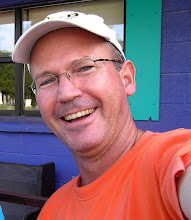Dripchak on "Developmentality: What, if anything, were they thinking?"
“Development” per se, is not a product but a process. It never ends. For example, say you’ve mastered creating formulas in an Excel spreadsheet, and now you want to automate the process with macros. Once that’s done, you want to move onto programming in Visual Basic so you can go beyond one spreadsheet, and on and on. I have never “targeted” development, but rather applied it toward a prioritized list of needs at a community level. The objective is to work oneself out of a job, and that the works left behind are important enough to the villagers, who have been trained, that they alone ensure maintenance and improvements.
That said, the process of development is often controlled through “facipulation” or facilitating the process toward some prescribed goals and objectives, thus manipulating the outcome. Faci + pulation. Might as well be open about it. There are so many agendas to deal with in a project that the “facipulator” has to know how to work his/her way through the morass of conflicting desires.
As for the idea of turning everyone into “little consumers like those of us in the US,” NO! Self-sufficiency is the goal. In fact, I’m often embarrassed by the opinions of Americans that I’ve come across in my work, many of which have been right on the mark, or others so far off that they inspire outrageous laughter, until you investigate where the opinion came from.
I originally joined the Peace Corps because I did not find working in the US of A potentially rewarding for me. There are so many social safeguards that my work would only bring satisfaction to me, if that were possible, but my satisfaction comes from knowing I might have helped someone do something better than s/he used to do it, and that I might have inspired the curiosity of that person to further test and improve the method. It’s kind of like watching and helping kids grow up. They beam with every new discovery, and when so inspired, go on to test other aberrations of your theory.
I completely agree with my colleague about learning overseas. I knew early on that I was only one person with a limited set of skills to share with others, while they were hundreds, each with something new for me. I definitely made out on that score! Never thought I could save the world, but I wanted to inspire the “Think Globally, Act Locally” approach to changing things. Another ‘ism that became prevalent during my work has been, “If you’re not part of the solution, then you’re part of the problem.” Too many times people who are excluded from processes sit on the sidelines and bitch about how things should be. I have seen many cases where getting them off their asses have been both positive and negative, but it was definitely better than listening to them bitch! And understanding WHY they are like that is tantamount to making any progress whatsoever.
This gets back to something we (?) used in the PC which was participatory appraisals. So many “experts” talk about how easy it is to do a PRA, but they obviously don’t have a clue. In the Congo recently, a researcher who was an ex-PCV in west Africa said something to the effect that after her two years in the PC, she thought a PRA was quick and easy. I did all I could to resist writing back to her to say that because I went to the zoo as a child, that I was an expert on elephants. When I was in Guatemala, we brought a woman from Virginia Tech to help train staff in PRA. The phrase that rings true to this day in my head is, “It’s the process and NOT the product.” She was SOOOOO right!
Some further thoughts:
I was once the point person for the organization in Guatemala for a “research” project under the USG SANREM project. The gurus from Virginia Tech thought I was dragging my feet on the process, but this was because they had not a clue what participation entailed, and I was in charge of the participatory appraisal component.
While in the Republic of Congo, I investigated why the economic alternative component had not been successful in the past. A former employee who had been responsible for it immediately confirmed my initial analysis that “the numbers” were far more important than the quality of the project. He said they were under pressure to reach and register as “participants” as many beneficiaries in the project area as soon as possible.
Again, a grave misunderstanding as to what “participatory” might imply.
When faced with a contrary opinion from the farmer’s side as to a recommendation from the extensionist, one needs to invest the time to understand why this is the case. What might be the reason(s) behind the non-acceptance of the extensionist’s sage advice.
Anyhow, hope this little message inspires some thought on the part of those of us who still have an impact on other peoples’ lives.
Saturday, March 07, 2009
Subscribe to:
Post Comments (Atom)



No comments:
Post a Comment